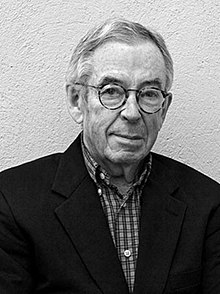
Back مايكل دوغلاس كو Arabic مايكل دوجلاس كو ARZ Maykl Ko Azerbaijani Майкл Коу Byelorussian Michael D. Coe Catalan Michael D. Coe German Michael D. Coe Spanish Michael D. Coe French Michael D. Coe ID Michael D. Coe Italian
Michael D. Coe | |
|---|---|
 | |
| Born | Michael Douglas Coe May 14, 1929 New York City, U.S. |
| Died | September 25, 2019 (aged 90) New Haven, Connecticut, U.S. |
| Citizenship | United States |
| Known for | Maya civilization |
| Scientific career | |
| Fields | anthropology, archaeology, epigraphy |
Michael Douglas Coe (May 14, 1929 – September 25, 2019)[1] was an American archaeologist, anthropologist, epigrapher, and author. He is known for his research on pre-Columbian Mesoamerica, particularly the Maya, and was among the foremost Mayanists[2] of the late twentieth century. He specialised in comparative studies of ancient tropical forest civilizations, such as those of Central America and Southeast Asia. He held the chair of Charles J. MacCurdy Professor of Anthropology, Emeritus, Yale University, and was curator emeritus of the Anthropology collection in the Peabody Museum of Natural History, where he had been curator from 1968 to 1994.[3]
Coe authored a number of popular works for the non-specialist audience, several of which were best-selling and much reprinted, such as The Maya (1966) and Breaking the Maya Code (1992). With Rex Koontz, he co-authored the book Mexico: From the Olmecs to the Aztecs, published in 1962.
- ^ "Michael D. Coe Obituary (1929 - 2019) New Haven Register". Legacy.com.
- ^ Merrin, Edward H. "The Olmec World of Michael Coe". Edward Merrin. Retrieved November 11, 2011.
- ^ "Michael Coe - in Memoriam | Department of Anthropology".